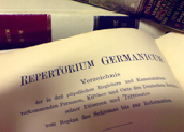RG Online
RG Online contains the source material of the Repertorium Germanicum and the Repertorium Poenitentiariae Germanicum.
Repertorium Germanicum: Dating back to a proposal by Ludwig Quidde, director of the Prussian Historical Institute from 1890 to 1892 and later winner of the Nobel Peace Prize, the Repertorium Germanicum comprises German incidences from all Vatican register series and Cameral holdings, from the Great Schism (1378) to the Reformation (1517). To date, material up until 1484 has been published. In the meanwhile, work has progressed until the second half of the 1480’s. The RG is not only useful for ecclesiastical, local and territorial German history, but is also a valuable source for social, economic and educational history. Written in Latin, the regesta are arranged, as far as possible, according to the name of the petente (petitioner), be that a clergyman, a nun, a lay person or an institution (convent, monastery, city council etc.). The database introduces translation guides on the system of abbreviations, which were created for that purpose.
Repertorium Poenitentiariae Germanicum: The archive of penitentiary records, the ultimate authority in the field, was opened in the 1980s, enabling the creation, in 1992, of the new Repertorium Poenitentiariae Germanicum (RPG) series headed by Ludwig Schmugge. The penitentiary had the right to exempt and to acquit. The RPG contains the full text of all petitions directed to the penitentiary that concern the people, churches and territories of the German Kingdom. The registers of penitentiary petitions extend from 1410 until the abolition of the chancery by Pio V in 1559 and make up around 150 volumes. Unlike the Repertorium Germanicum, the entries in the RPG are handwritten. In addition to the contents shared with the RG, the RPG offers an in-depth insight into the conflicts of conscience experienced by believers in the late middle ages (1431-1492). This basic research project was completed with the publication of volume XI on the pontificate of Pope Adrian VI.


